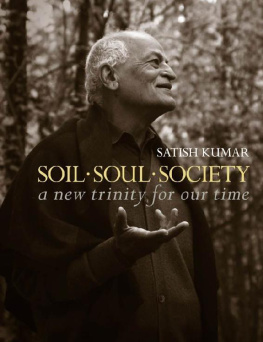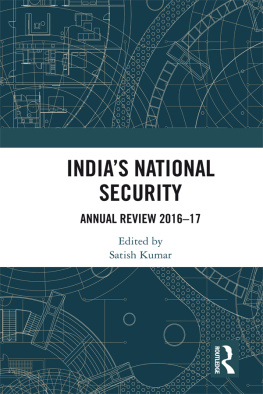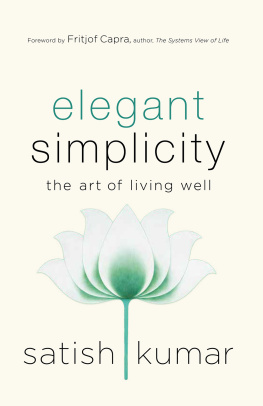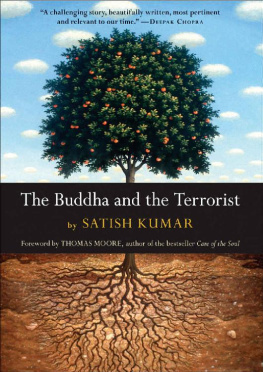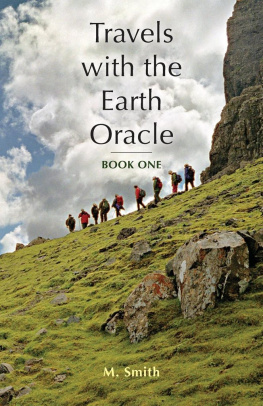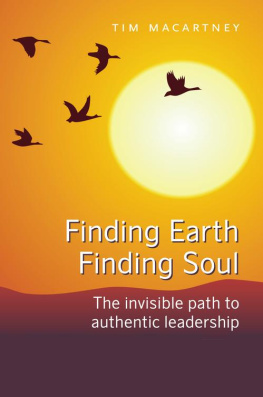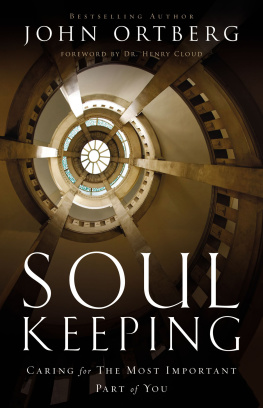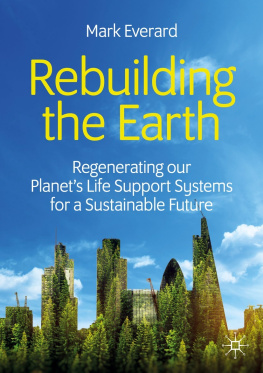DEDICATION
To my friends and hosts
James & Margaret Sainsbury

SATISH KUMAR
SOIL SOUL SOCIETY
a new trinity for our time

Satish Kumar elucidates the eastern wisdom for the west. In a nutshell, he says that caring for the natural environment (Soil), maintaining personal wellbeing (Soul) and upholding human values (Society) are the moral imperatives of our time. This book shows that this holistic vision is enshrined in the ancient philosophies of Hindu, Buddhist and Jain traditions of India which were revived for our time by Mahatma Gandhi and Rabindranath Tagore. In turn these ideas were brought to the west by E.F. Schumacher in his book, Small is Beautiful.
To facilitate the emergence of a new sustainable future we need to bring about an educational transformation by replacing the three Rs (Reading, Writing, and Arithmetic) with three Hs (education of Head, Heart and Hands). This book offers a recipe and guidance for a gentle revolution in our thinking and in our way of life.
Contents
Satish Kumar A Man of Courage & Imagination
F or more than twenty years now Satish Kumar has been one of my most valued friends, not only because of his own warm, inspirational nature, but also because of the number of other visionaries to whom Ive been introduced through working with him at Schumacher College and elsewhere.
Among those distinguished radical thinkers was the archetypal psychologist James Hillman, whose marvellous book The Souls Code promotes the understanding that we do not come into this world as a blank slate but with intimations of who we already are and what our life is meant to be about. In support of his thesis Hillman quotes many convincing examples of people whose destinies were shaped by such intuitive knowledge, but it seems to me that he need have looked no further for conclusive proof of the truth of his thesis than in the life of his friend Satish.
Why else, I wonder, should a 9-year-old boy in Rajasthan have told his family that the time had come for him to leave home and join the Jain Monks who, in their absolute reverence for life, are among the strictest of all spiritual orders, unless he already knew it his duty to become a Pilgrim of the Earth? How else to explain the promptings of the inner voice which told Satish, when he was 18 and aware of the suffering and injustice in the world, to leave that mendicant order, and follow the teachings of Mahatma Gandhi by joining Vinoba Bhaves non-violent campaign for land reform in India?
How else to account for the fact that in 1962 Bertrand Russells campaign for nuclear disarmament inspired Satish and his friend E.P. Menon to walk, without a penny in their pockets, on a pilgrimage for peace from New Delhi to Moscow, Paris, London and Washington, carrying a packet of peace tea for each leader of the four nuclear powers with the advice that, before resorting to nuclear warfare as a solution to their problems, they should sit down and have a quiet cup of tea? And then, how else to account for the fact that when he came to the UK in 1973 this sprightly idealist from such humble beginnings should quickly establish himself as one of the most serious and significant voices in the land?
Satish Kumar is clearly a man who has honoured with exemplary courage and imagination the special destiny that brought him into this life. He has won an international reputation as the editor of Resurgence, the magazine which for decades now has been the most articulate champion of ecological awareness, of social and economic justice, and of a reverent way of life characterized by a philosophy of non-violence and humane spiritual values. By starting The Small School in Hartland he created a model for imaginative community education; and as the energetic founding Director of Schumacher College he has brought some of the worlds most important thinkers and activists to teach in this country while playing his own vital role in the evolution of consciousness that is trying to happen in our time.
Out of his passionate care for the life of this beautiful planet which we harm in so many destructive ways, Satish Kumar has long been a tireless campaigner on issues of urgent importance. Whether as editor, educator, writer, or speaker on radio and television, his life and work are a vital demonstration of what can be achieved when our sense of the world and our activities within it are re-invested with the healing and transformative powers of the soul. Those powers will be found, excitingly alive and well, within the pages of this book.
LINDSAY CLARKE
Gratitude
T his book would not have been possible without the help and support of June, my wife. Most mornings we have non-domestic conversations over a cup of tea when old ideas are revisited, new ideas are explored and some tentative conclusions are crystallized. These meandering conversations flow freely. They come and go for most of the time, but some of them have stayed in my thoughts and now have resulted in this book.
Moreover, June has been most generous with her time and participated in this process of writing, critiquing and revising. No words can do justice to express my deep gratitude to June for her attention and engagement.
Also I would like to thank profusely Lee Cooper, my friend for forty years, who has typed the handwritten manuscript meticulously. Lee, June and I started to work together on Resurgence magazine in 1973. Ever since, Lee has been, and still is, a pillar of strength.
My heartfelt thanks go to Elaine Green, who has been working with me and assisting me with my writings now for over a decade. Her selfless support is invaluable in putting the final shape to this book.
And my deep appreciation is for Monica Perdoni, who inspired and encouraged me to write this book in the first place. Editing Resurgence and Ecologist, teaching at Schumacher College and fulfilling my public speaking engagements leave very little time to write a new book. But it is Monicas friendship and persuasion that have enabled me to set some time aside and put these words on paper. So, thank you, Monica!

Foreword
S oil is the source of all life, literally and metaphorically. All life comes from the mother soil and returns to her. I love soil as my mother and take care of her. Soil contains earth, air, fire and water. She is nature herself.
If my outer body is soil, then my inner being is the soul. As I cultivate the soil to grow food for the body, I take care of the soul and cultivate love, compassion, beauty and unity to realize the harmony within and without.
When I am at ease within, I am at ease without. I am at ease with the whole of humanity. Through caring for soil I am a member of the Earth community and through caring for society I am a member of the human community. Billions of people, with their diversities of cultures and colours, are one human family. I suffer with their suffering and I rejoice in their happiness. Then I can transcend in the sphere of equanimity.
Therefore the trinity of Soil, Soul, Society is a way of saying in three words that we are all related, interconnected and interdependent. This is a trinity of wholeness and unity of life in its myriad forms.

Introduction
T he trinity of Soil, Soul, Society is a distillation of much learning and living. Born and brought up in India for the first half of my life and then living in the West for the second half, I have gained much from both worlds, for which I am grateful.
Next page
